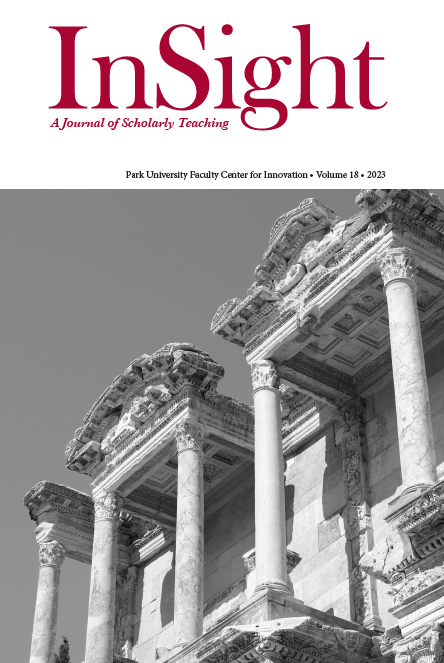
From the Editor…
In looking back over the last 5 volumes of InSight I have edited, I am struck by how neatly each volume concentrates around themes that only become fully clear once we put the volume together for print. These themes show us a snapshot of trends, questions, and concerns in a particular social/ cultural moment. This last year has been marked by major advancements in technology as ChatGPT and other AI became a huge topic of discussion nationwide, a concern which I am delighted to say Darby Flower (of Small Teaching Online) reassuringly addresses by reminding us that doing what we do, namely scholarly teaching, is the very set of skills, values, and aptitudes that make us perfectly suited for meeting the challenges that AI presents us.
This relates to a major theme I saw emerge in submissions this year, a focus on technology and online teaching, not surprising considering how many of us have experienced the rapid and massive shift to online teaching during and after the pandemic. In this volume, you will see our colleagues rising to the digital challenge by showing us what strategies work well in online discussions for graduate and undergraduate students, helping us understand how to better mentor new faculty in the post-COVID world, and showing us how even very simple technologies can be used to make teaching and learning fun while maintaining rigor and engagement in our course material.
As you will see in our student editorial in this volume, students also have a lot to share with us about technology, online courses, and their perceptions of our pedagogy in general. One major thing I have prioritized at InSight during my editorship was highlighting the words and opinions of our students; after all, without them, we would have nothing to do! So much pedagogical research is written from the view of teachers, institutional assessments, or administrative priorities, while student voices are curiously absent. This was the main impetus for starting the student editorial feature at InSight, and I am thrilled to share with you David Stewart’s piece on rethinking online discussion boards, a timely and helpful call-to-action given the increasingly online environment many of us teach in.
I am also especially pleased to see that in putting together this volume, we also had several other pieces honor student voices and opinions. In this volume, you will hear students’ voices in selections from autoethnographies in which students grapple with their professional identities as teachers-to-be, read how students perceive their relationships with their instructors, and get some insight into how students organize, conceptualize, and evaluate their own performance in collaborative groups.
So, what do the patterns in this volume tell us? It seems to me that although we have faced (and will continue to face) a number of technological challenges in higher education, we can meet those challenges by focusing on the aspects of teaching and learning that are uniquely human – innovation, connection, engagement, relationship. As the contributors to this volume amply demonstrate, there is no artificial intelligence substitute for us!
And on that forward-looking note, I would like to share with you that this is my last volume as editor of InSight. I have loved being part of InSight’s mission for the last 5 years, and I have learned so much from all of you: readers, authors, peer-reviewers, students, and colleagues.
I would like to thank all of the peer reviewers and authors for their hard work making this volume a reality. Many thanks to David Stewart and Isabella Clark, our outstanding editorial interns. I would additionally like to thank Taylor Lucas for her efficient and speedy proofreading. We are also grateful for the support of the Director of the Faculty Center for Innovation, Dr. Amber Dailey‐Hebert, and Vice Provost Dr. Emily Sallee, Drs. Stacey Kikendall and Jean Mandernach, advisory board members, and the rest of the FCI team. A very special thanks goes to Dr. Jamie Els, InSight’s assistant editor, who I am delighted to say will be taking over as editor for the next volume. I have enjoyed working with her on the last 5 volumes and remain deeply appreciative of her knowledge and assistance when getting InSight into print every year. I am so excited to see what direction InSight will take under her expert guidance, and I know it is going to be fantastic!
– Amy Mecklenburg-Faenger, PhD
